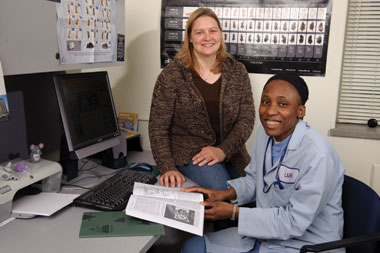
Former Training Coordinator Kristi Hall talks with Helen Akere, animal research technician and recipient of CARES support, in the training room used by UW School of Medicine and Public Health Laboratory Animal Resources staff. Hall is now the Scientific Administrator for the AIDS Vaccine Research Laboratory.
Gordon Mitchell sees the benefits of animal research firsthand. Mitchell is professor and chair of the Department of Comparative Biosciences in the University of Wisconsin-Madison School of Veterinary Medicine.
As part of his annual lecture on the history of research, Mitchell asks how many students were born more than one month prematurely. “When I started giving this lecture in the early 1980s, few students ever raised their hand,” Mitchell said. “Today, two to eight students raise their hands in nearly every class. These are students that may not have survived without the discovery of effective therapies—all therapies based on animal research.”
It was not until animal research discovered a substance known as lung/pulmonary surfactant that the often-fatal Infant Respiratory Distress Syndrome of premature infants could be understood. Preemies had inadequate surfactant, leading to lung collapse. “Through years of animal research,” said Mitchell, “therapies based on surfactant replacement were developed, allowing most of these babies to live.”
At any given time on the University campus, there are approximately 1,100 approved activities that involve live vertebrate animals in some way. About 95 percent of these activities are research projects and involve mice or rats. Other activities include laboratory courses and outreach to the community. All activities have been approved by one or more of six Animal Care and Use Committees on campus.
“Dedicated and knowledgeable animal care takers are critical to the success of our work,” Mitchell said. “The animals benefit, the researchers benefit and the public benefits because quality research will advance medical care.”
The animal care takers Mitchell refers to are classified employees known as Animal Research Technicians, or ARTs. More than 150 individual employees hold these positions across the UW-Madison campus and are responsible for providing basic animal husbandry in units such as the School of Medicine and Public Health, the Dairy Cattle Center and the Biochemistry Department. All new ARTs are trained by the staff of the Research Animal Resources Center on campus, and ARTs often receive other training opportunities in their individual employing units. The Research Animal Resources Center trainers also provide customized instruction to scientists, researchers and employees who work with research animals.
The American Association for Laboratory Animal Science is a national organization that offers certifications in three levels of competency for ARTs. Knowing these classified employees are on the front line of defense in assuring research animals are well-cared-for and healthy, the University offers a free 14-week course that meets 90 minutes each week at the Research Animal Resources Center to prepare ARTs for the exam to obtain the first level of certification.
I really appreciate those people who contribute to the fund. The training complements the experience I gain on a daily basis as I perform my job duties.
Helen Akere
While the class and materials are free, the individual ART must pay at least $190 for their exam and fees. When administrators and trainers learned that this cost stood in the way of some ARTs completing the exams, they established a scholarship fund to help eliminate the barrier. The Caring for Animals in Research Employee Scholarship was created in 2008, and it is now supported across campus by people who value the contributions of ARTs and want to encourage their career development.
“I enjoyed the class and I gained a lot of knowledge,” Helen Akere said. She has worked as an ART for more than two years and has been certified in two of the three levels offered. Akere received a scholarship for her first exam and fees. “I really appreciate those people who contribute to the fund. The training complements the experience I gain on a daily basis as I perform my job duties.”
“Educated and concerned care takers can make all the difference in the world,” said Professor Mitchell, “by assuring that these animals receive the quality care they deserve.”
